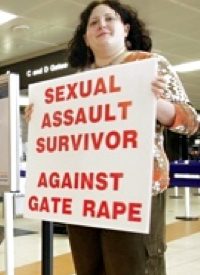
After a glitch temporarily paralyzed a checkpoint at Austin Bergstrom International Airport (ABIA), 56-year-old Claire Hirschkind, one of the first in line after security checks resumed, never made it through.
According to KVUE.com (ABC-TV), the TSA claims less than three percent of travelers get a pat-down. Hirschkind was one of the unlucky ones.
In an interview with The New American, Hirschkind explained that her story began after a Thanksgiving trip to San Francisco. Because of a pacemaker-type implant in her chest (for an epileptic condition), she cannot be subjected to full-body scanners. When she left San Francisco, she discovered that scanners had been installed in the airport during her stay. Opting out of the scanning, she ended up enduring an unexpected, humiliating and aggressive pat-down. Subjected to groping and squeezing of her breasts and private area in full view of other travelers, she also experienced a re-living of old traumas she had suffered as a rape victim.
So in an effort to avoid a repeat of her Thanksgiving trip, Hirschkind decided to plan in advance for Christmas travel. She called Mike Scott, the ABIA Director of Security, to find out what to expect, and he assured her, "No such thing will happen to you here in Austin, ma’am."
But it did. Even though the Austin airport does not have full-body scanners, Hirschkind decided to play it safe, so upon arriving at the checkpoint, she asked if the AIT scanners were in use, informing the agent she needed to avoid them because of the implant. Told to step aside, she was led to a screening area where a female TSA employee and three Austin police officers informed her she would be patted down.
Hirschkind told the officers and the TSA employee about her implant and agreed to either a pat-down of the implant area in her chest, to wanding, or to passing through the traditional metal detector — in other words, any other kind of screening. She recalls:
I turned to the police officer and said, "I have given no due cause to give up my constitutional rights. You can wand me," and they said, "No, you have to do this."
Hirschkind, who remained cooperative and had determined not to raise her voice or engage in name-calling, agreed to the pat-down, but on one condition:
I told them, "No, I’m not going to have my breasts felt," and she [the TSA agent] said, "Yes, you are."
She then asked to see Security Director Scott, telling the officers she had already spoken with him about the issues. Her request was disregarded.
Hirschkind repeated that she was an American citizen and was entitled to her paid-for trip and her rights as a citizen. She was told she would be forced out of the airport. She claimed that was illegal, and says the officers told her she was breaking the law. The three officers then pushed her to the ground as she was crying, handcuffed her and dragged her across the floor in full view of others nearby. While she was on the floor, one officer told her, "You think you have the right to cry? You don’t."
She sustained minor injuries as they picked her up, put her in a wheelchair, and took her to a cell. Informed she was under arrest, she asked “for what charge?” The answer: criminal trespass and disobedience to police and airport operations employees.
When told she would be taken from the airport to city jail, she felt her epileptic condition escalating and asked to go to a hospital. An ambulance was called and she was taken to a nearby facility.
Hirschkind says she is alarmed by the reaction of others in the airport. Two travelers interviewed by KVUE responded that while they empathized with her, the law is the law. Gwen Washington, a Killeen, Texas resident, observed:
I understand her side of it, and their side as well, but it is for our protection so I have no problems with it.
Emily Protine, another passenger who witnessed Hirschkind’s ordeal, responded:
It’s unfortunate that that happened and she didn’t get to fly … but it makes me feel a little safer.
Hirschkind, though dismayed by these reactions from the flying public, remains determined to educate others that, contrary to the opinions of these travelers, TSA policy is not law. She comments:
I don’t understand why I was arrested when I wasn’t breaking any laws. I was just claiming my right not to be molested.
She has retained a lawyer to contest the charges.
Although Hirschkind’s case is a more visible example of TSA bullying, it’s not the first instance of resistance to the TSA in the capitol city of Texas. Curiously, Austin — known for the liberal bent of many of its residents — is home to grassroots opposition to the TSA: Texans for Accountable Government (TAG), which recently protested scanners in the city’s airport. In response to that protest as well as opposition from other concerned citizens, on December 14 the Austin Airport and Advisory Commission passed a unanimous resolution opposing deployment of scanners at Bergstrom International airport, and told the TSA to go back to the drawing board.
TAG is also leading the effort petitioning the city council to oppose the scanners, which will lend teeth to the idea. Other cities around the country, including Colorado Springs, New York and Orlando, have also voiced opposition to the scanners.
At the meeting resulting in the Advisory Commission resolution, TAG spokesperson Heather Fazio expressed the outrage felt by many around the country, especially those such as Hirschkind, in a statement to the airport’s Director of Security Mike Scott:
We have the option of being molested instead of being virtually strip-searched … How dare you? Now you tell me, who are the real terrorists in this country?
Photo: Halina Reed, of Phoenix, protests outside a security gate at Sky Harbor International Airport, Nov. 24, 2010 in Phoenix.: AP Images



